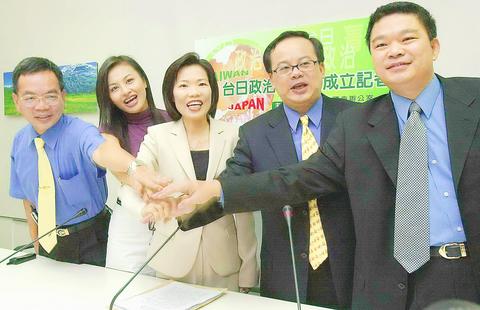Dozens of DPP lawmakers yesterday formed a group that vows to make the signing of a free-trade agreement with Japan its top task, nearly 20 years after the country severed diplomatic ties with Taiwan.
The group, called the Taiwan-Japan Political Elite Association, will serve as a venue of communication between legislators from the two countries despite the absence of official ties, Tang Bi-a (唐碧娥) said at the opening ceremony.
"The inauguration of the group is significant, as Sept. 29 will mark the 20th anniversary of the cutting of diplomatic relations between the two sides," said Tang, who organized the association.

PHOTO: CHIANG YING-YING, TAIPEI TIMES
Formed by 25 DPP lawmakers, most of whom were born in the 1960s, the group hopes to improve exchanges culminating in the signing of a free-trade agreement in the near future.
Tang said that while private exchanges between Taiwan and Japan have not ceased, pressure from China has made progress in official contact very slow.
Hsiao Bi-khim (蕭美琴), a group member and director of the DPP's Department of International Affairs, said that being young and vigorous, the new association will stand apart from other existing groups with a similar agenda.
To that end, the US-educated lawmaker is learning Japanese in the hope of strengthening communication with her Japanese counterparts.
Tsai Huang-liang (
Fellow colleague Lai Ching-te (賴清德), who in May traveled to Geneva to advocate Taiwan's entry to the WHO, said it is in Taiwan's interest to improve ties with Japan. He noted that despite protest from China, Japan openly voiced support for the country's WHO bid.

Alain Robert, known as the "French Spider-Man," praised Alex Honnold as exceptionally well-prepared after the US climber completed a free solo ascent of Taipei 101 yesterday. Robert said Honnold's ascent of the 508m-tall skyscraper in just more than one-and-a-half hours without using safety ropes or equipment was a remarkable achievement. "This is my life," he said in an interview conducted in French, adding that he liked the feeling of being "on the edge of danger." The 63-year-old Frenchman climbed Taipei 101 using ropes in December 2004, taking about four hours to reach the top. On a one-to-10 scale of difficulty, Robert said Taipei 101

Nipah virus infection is to be officially listed as a category 5 notifiable infectious disease in Taiwan in March, while clinical treatment guidelines are being formulated, the Centers for Disease Control (CDC) said yesterday. With Nipah infections being reported in other countries and considering its relatively high fatality rate, the centers on Jan. 16 announced that it would be listed as a notifiable infectious disease to bolster the nation’s systematic early warning system and increase public awareness, the CDC said. Bangladesh reported four fatal cases last year in separate districts, with three linked to raw date palm sap consumption, CDC Epidemic Intelligence

US climber Alex Honnold left Taiwan this morning a day after completing a free-solo ascent of Taipei 101, a feat that drew cheers from onlookers and gained widespread international attention. Honnold yesterday scaled the 101-story skyscraper without a rope or safety harness. The climb — the highest urban free-solo ascent ever attempted — took just more than 90 minutes and was streamed live on Netflix. It was covered by major international news outlets including CNN, the New York Times, the Guardian and the Wall Street Journal. As Honnold prepared to leave Taiwan today, he attracted a crowd when he and his wife, Sanni,

Taiwanese and US defense groups are collaborating to introduce deployable, semi-autonomous manufacturing systems for drones and components in a boost to the nation’s supply chain resilience. Taiwan’s G-Tech Optroelectronics Corp subsidiary GTOC and the US’ Aerkomm Inc on Friday announced an agreement with fellow US-based Firestorm Lab to adopt the latter’s xCell, a technology featuring 3D printers fitted in 6.1m container units. The systems enable aerial platforms and parts to be produced in high volumes from dispersed nodes capable of rapid redeployment, to minimize the risk of enemy strikes and to meet field requirements, they said. Firestorm chief technology officer Ian Muceus said